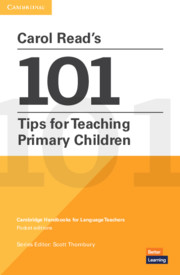Book contents
- Frontmatter
- Contents
- Acknowledgements
- Why I Wrote this Book
- A Getting Started
- B Core Skills
- C Classroom Management
- D Lesson Planning
- E Learning how to Learn
- F Storytelling
- G Playing Games
- H Values Education
- I Songs, Rhymes, Chants and Raps
- J Working with Projects
- K Intercultural Competence
- L Content-Based Learning (CLIL)
- M Thinking Skills
- N Vocabulary
- O Life Skills
- P Art, Craft and Design
- Q Mime and Drama
- R Inclusion and Diversity
- S Creativity
- T Adapting or Writing Materials
- U Listening and Speaking
- V Reading and Writing
- W Multiliteracies
- X Grammar
- Y Assessment
- Z The Last Word
- Glossary
- Selected Further Reading
- Index
H - Values Education
Published online by Cambridge University Press: 28 October 2023
- Frontmatter
- Contents
- Acknowledgements
- Why I Wrote this Book
- A Getting Started
- B Core Skills
- C Classroom Management
- D Lesson Planning
- E Learning how to Learn
- F Storytelling
- G Playing Games
- H Values Education
- I Songs, Rhymes, Chants and Raps
- J Working with Projects
- K Intercultural Competence
- L Content-Based Learning (CLIL)
- M Thinking Skills
- N Vocabulary
- O Life Skills
- P Art, Craft and Design
- Q Mime and Drama
- R Inclusion and Diversity
- S Creativity
- T Adapting or Writing Materials
- U Listening and Speaking
- V Reading and Writing
- W Multiliteracies
- X Grammar
- Y Assessment
- Z The Last Word
- Glossary
- Selected Further Reading
- Index
Summary
Values are core attitudes and beliefs that underlie and influence the way we think and act in different situations. Values education is to do with guiding children's thinking and behaviour in order to help them to realise their individual potential and become responsible members of the community.
Values education refers to three main spheres of children's lives. These are:
1. the values that children hold in relation to themselves, such as honesty, reliability, perseverance and resilience;
2. the values that children hold in relation to others, such as kindness, empathy, tolerance and respect;
3. the values that children hold towards the world around them, such as looking after the environment, the treatment of animals and issues of social justice.
Although parents are the main influence in the formation of children's values, teachers have a significant role to play. My experience over the years has convinced me that, through systematically integrating values education into everything you do in the classroom, you not only foster children's sense of wellbeing (see 57) and develop positive relationships (see 5) but are also more likely to achieve better academic and language learning outcomes as well. However, it's also important to remember that values education is a complex, dynamic process, rather than a checklist of items to be learnt. It takes place gradually over time in harmony with other aspects of children's cognitive, emotional, social and psychological development.
My key tips for values education are:
29 Be aware of your role
30 Focus on values close to the child's world
31 Use a tool kit of values activities
32 Promote effort and resilience
29 Be aware of your role
Children learn values in different ways over time. Your role in this is crucial.
Everything you do in the classroom, from the way you greet children to the way you manage learning, praise children or tell them off, gives a message about your own values. Here are four key ways to integrate positive values into your everyday teaching:
• Socialisation: children learn values when their habits are approved or not by the adults around them, and they understand the reasons for this. If you insist on, and acknowledge, the use of ‘please’ and ‘thank you’ in order to be polite, children internalise this behaviour and learn to recognise its value.
- Type
- Chapter
- Information
- Carol Read’s 101 Tips for Teaching Primary Children , pp. 36 - 40Publisher: Cambridge University PressPrint publication year: 2020



